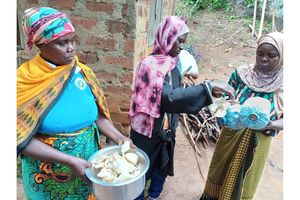Tanzania gets EU funding for sunflower

What you need to know:
The aims are to increase value addition and upgrade the sunflower value chain programme as tariffs and non-tariff barriers have been biting.
Dar es Salaam. The European Union (EU) has released 30 per cent of €1.4 million to support Tanzania’s efforts to achieve regional industrial competitiveness.
The aims are to increase value addition and upgrade the sunflower value chain programme as tariffs and non-tariff barriers have been biting.
“We operate in a difficult condition,” Tanzania Sunflower Process Association chairman Ringo Iringo laments. He urged the government to intervene to have quality sunflowers.
The communications officer at the EU Delegation in Tanzania, Ms Sussane Mbise, told The Citizen that 30 per cent of €1.4 million had already been disbursed in accordance with the contract.
“This is for the support to Tanzania’s regional industrial competitiveness through increased value addition and upgrading of the sunflower chain programme.”
Tanzania and EU signed a trade-related facility contract worth €1.4 million as part of efforts to strengthen the value addition of agricultural products and minerals. This is line with the industrialisation drive.
The deal aims at increasing the share of domestically produced sunflower oil to reduce imports.
“Challenges remain in ensuring adequate supplies of quality seed for the cluster and ensuring that processing and handling comply with standards and food safety requirements among the processors,” she said.
The programme intends to build the capacity of local firms and support institutions along the value chain so that they improve the quality of products offered to the domestic, regional and international markets.
Tanzania will receive the payment in advance on the programme’s overall budget and further payments will be released on the basis of results achieved as indicated in the performance assessment framework agreed between Tanzania and the Southern African Development Community (SADC).
The SADC Trade Related Facility is aimed at implementing commitments made under the bloc’s protocol on trade and the Economic Partnership Agreement (EPA) between the EU and the SADC EPA Group.
The overall objective of the Trade Related Facility is to improve the participation of SADC member states in regional and international trade to contribute to sustainable development of the bloc.
According to Second Sunflower Strategy (2016 to 2022), Tanzania seeks to increase the crop production and productivity to meet market needs: national and international.
The target is expected to be achieved through increased availability and accessibility of certified sunflower seeds and improve the distribution of fertilisers and pesticides.
The capacity of farmers and their associations in producing quality sunflower seeds will be strengthened. Access to finance and insurance serviced along the value chain will be simplified and encourage the use of modern technologies.
There is further need to improve transparency and trust across the value chain, particularly through the development of a code of conduct on best practices and promote contract farming.
A Tanzania Private Sector Foundation (TPSF) report titled ‘Consultancy Services for the Fiscal Policy Study on Edible Oil Sector in Tanzania’ of 2017 cites low seed quality and poor accessibility of seeds as main challenges facing sunflower farmers.
TPSF revealed that cooking oils worth Sh293 billion were imported in 2010. The value rose to Sh655 billion in 2016. Exports grew from Sh77 billion to Sh910 billion during the same period.
Sunflower was first commercially produced in Russia.
Today, major producers with their percentages in brackets are the Russian Federation (25), Ukraine (22) and the EU (22).
Africa accounts for 5.5 per cent of the world’s production, with strong growth experienced in the past decade. It is envisaged that through the EU support, Tanzania will be able to increase its production and start exporting sunflower oil to Europe.
Sunflower oil imports have been increasing fast over the last decade compared with competing edible oils. This is due to growing consumer awareness as sunflower oil has lower cholesterol oils.
The EU is a major producer and importer of seeds and oil as well as processed products.
In 2013 it was the largest market for oilseed cakes, accounting for 25 per cent of world production and 45 per cent of demand for world production.
The Rural Livelihood Development Company estimated the demand for cooking oils in Tanzania was 330,000 tonnes annually, with a yearly increase of 3 per cent.
Currently, more than half of the amount of edible oils consumed is imported.
Tanzania’s market share in world trade rose from 0.04 per cent in 2005 to 0.49 per cent in 2014.
Sunflower oil is the non-volatile oil pressed from the seeds of sunflower. Sunflower oil is commonly used in food as a frying oil, and in cosmetic formulations as an emollient. According to botanists, sunflower oil is a monounsaturated/polyunsaturated mixture of mostly oleic acid (omega-9)-linoleic acid (omega-6) group of oils.
The oil content of the seed ranges from 22 per cent to 36 per cent (average, 28 per cent).
The kernel contains 45–55 per cent oil.
The oil contains appreciable quantities of vitamin E, sterols, squalene, and other aliphatic hydrocarbons.




